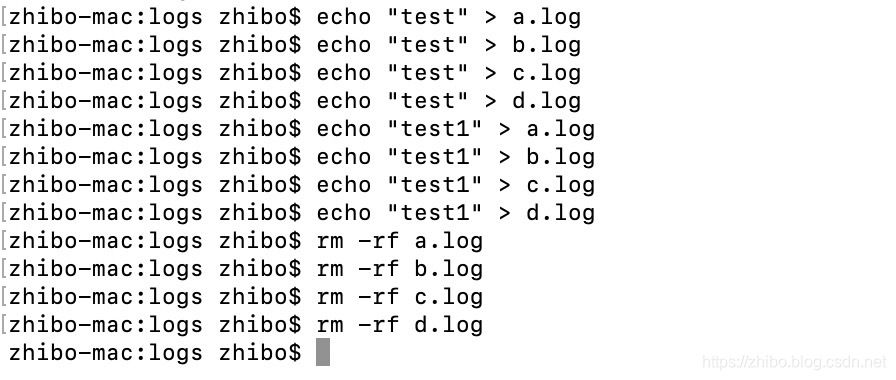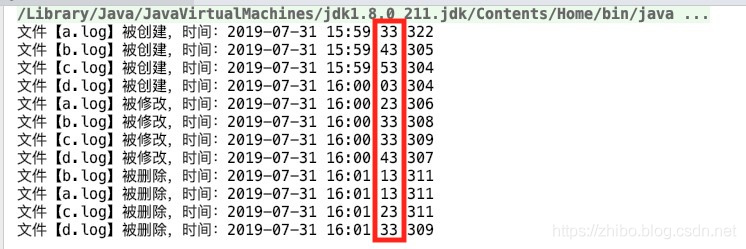java.nio.file.WatchService 监控文件变化
志波同学 人气:0在平时的开发过程中,会有很多场景需要实时监听文件的变化,如下:
1、通过实时监控 mysql 的 binlog 日志实现数据同步
2、修改配置文件后,希望系统可以实时感知
3、应用系统将日志写入文件中,日志监控系统可以实时抓取日志,分析日志内容并进行报警
4、类似 ide 工具,可以实时感知管理的工程下的文件变更
在 Java 语言中,从 JDK7 开始,新增了java.nio.file.WatchService类,用来实时监控文件的变化。
1.示例代码
FileWatchedService 类:
package org.learn.file;
import java.io.IOException;
import java.nio.file.FileSystems;
import java.nio.file.Path;
import java.nio.file.Paths;
import java.nio.file.StandardWatchEventKinds;
import java.nio.file.WatchEvent;
import java.nio.file.WatchKey;
import java.nio.file.WatchService;
import java.util.List;
/**
* 实时监控文件的变化
*
* @author zhibo
* @date 2019-07-30 20:37
*/
public class FileWatchedService {
private WatchService watchService;
private FileWatchedListener listener;
/**
*
* @param path 要监听的目录,注意该 Path 只能是目录,否则会报错 java.nio.file.NotDirectoryException: /Users/zhibo/logs/a.log
* @param listener 自定义的 listener,用来处理监听到的创建、修改、删除事件
* @throws IOException
*/
public FileWatchedService(Path path, FileWatchedListener listener) throws IOException {
watchService = FileSystems.getDefault().newWatchService();
path.register(watchService,
/// 监听文件创建事件
StandardWatchEventKinds.ENTRY_CREATE,
/// 监听文件删除事件
StandardWatchEventKinds.ENTRY_DELETE,
/// 监听文件修改事件
StandardWatchEventKinds.ENTRY_MODIFY);
//
// path.register(watchService,
// new WatchEvent.Kind[]{
// StandardWatchEventKinds.ENTRY_MODIFY,
// StandardWatchEventKinds.ENTRY_CREATE,
// StandardWatchEventKinds.ENTRY_DELETE
// },
// SensitivityWatchEventModifier.HIGH);
this.listener = listener;
}
private void watch() throws InterruptedException {
while (true) {
WatchKey watchKey = watchService.take();
List<WatchEvent<?>> watchEventList = watchKey.pollEvents();
for (WatchEvent<?> watchEvent : watchEventList) {
WatchEvent.Kind kind = watchEvent.kind();
WatchEvent<Path> curEvent = (WatchEvent<Path>) watchEvent;
if (kind == StandardWatchEventKinds.OVERFLOW) {
listener.onOverflowed(curEvent);
continue;
} else if (kind == StandardWatchEventKinds.ENTRY_CREATE) {
listener.onCreated(curEvent);
continue;
} else if (kind == StandardWatchEventKinds.ENTRY_MODIFY) {
listener.onModified(curEvent);
continue;
} else if (kind == StandardWatchEventKinds.ENTRY_DELETE) {
listener.onDeleted(curEvent);
continue;
}
}
/**
* WatchKey 有两个状态:
* {@link sun.nio.fs.AbstractWatchKey.State.READY ready} 就绪状态:表示可以监听事件
* {@link sun.nio.fs.AbstractWatchKey.State.SIGNALLED signalled} 有信息状态:表示已经监听到事件,不可以接续监听事件
* 每次处理完事件后,必须调用 reset 方法重置 watchKey 的状态为 ready,否则 watchKey 无法继续监听事件
*/
if (!watchKey.reset()) {
break;
}
}
}
public static void main(String[] args) {
try {
Path path = Paths.get("/Users/zhibo/logs/");
FileWatchedService fileWatchedService = new FileWatchedService(path, new FileWatchedAdapter());
fileWatchedService.watch();
} catch (IOException e) {
e.printStackTrace();
} catch (InterruptedException e) {
e.printStackTrace();
}
}
}
FileWatchedListener 类:
package org.learn.file;
import java.nio.file.Path;
import java.nio.file.WatchEvent;
public interface FileWatchedListener {
void onCreated(WatchEvent<Path> watchEvent);
void onDeleted(WatchEvent<Path> watchEvent);
void onModified(WatchEvent<Path> watchEvent);
void onOverflowed(WatchEvent<Path> watchEvent);
}FileWatchedAdapter 类:
package org.learn.file;
import java.nio.file.Path;
import java.nio.file.WatchEvent;
import java.text.DateFormat;
import java.text.SimpleDateFormat;
import java.util.Calendar;
/**
* 文件监听适配器
*
* @author zhibo
* @date 2019-07-31 11:07
*/
public class FileWatchedAdapter implements FileWatchedListener {
@Override
public void onCreated(WatchEvent<Path> watchEvent) {
Path fileName = watchEvent.context();
System.out.println(String.format("文件【%s】被创建,时间:%s", fileName, now()));
}
@Override
public void onDeleted(WatchEvent<Path> watchEvent) {
Path fileName = watchEvent.context();
System.out.println(String.format("文件【%s】被删除,时间:%s", fileName, now()));
}
@Override
public void onModified(WatchEvent<Path> watchEvent) {
Path fileName = watchEvent.context();
System.out.println(String.format("文件【%s】被修改,时间:%s", fileName, now()));
}
@Override
public void onOverflowed(WatchEvent<Path> watchEvent) {
Path fileName = watchEvent.context();
System.out.println(String.format("文件【%s】被丢弃,时间:%s", fileName, now()));
}
private String now(){
DateFormat dateFormat = new SimpleDateFormat("yyyy-MM-dd HH:mm:ss SSS");
return dateFormat.format(Calendar.getInstance().getTime());
}
}
执行以上代码,启动监控任务,然后我在/Users/zhibo/logs/目录中创建、修改、删除文件,命令如下:

应用程序感知到文件变化,打印日志如下:

2.其实并没有实时
大家可以看到,监控任务基本上是以 10 秒为单位进行日志打印的,也就是说修改一个文件,WatchService 10秒之后才能感知到文件的变化,没有想象中的那么实时。根据以上的经验,推测可能是 WatchService 做了定时的操作,时间间隔为 10 秒。通过翻阅源代码发现,在 PollingWatchService 中确实存在一个固定时间间隔的调度器,如下图:

该调度器的时间间隔有 SensitivityWatchEventModifier 进行控制,该类提供了 3 个级别的时间间隔,分别为2秒、10秒、30秒,默认值为 10秒。SensitivityWatchEventModifier 源码如下:
package com.sun.nio.file;
import java.nio.file.WatchEvent.Modifier;
public enum SensitivityWatchEventModifier implements Modifier {
HIGH(2),
MEDIUM(10),
LOW(30);
private final int sensitivity;
public int sensitivityValueInSeconds() {
return this.sensitivity;
}
private SensitivityWatchEventModifier(int var3) {
this.sensitivity = var3;
}
}通过改变时间间隔来进行验证,将
path.register(watchService,
/// 监听文件创建事件
StandardWatchEventKinds.ENTRY_CREATE,
/// 监听文件删除事件
StandardWatchEventKinds.ENTRY_DELETE,
/// 监听文件修改事件
StandardWatchEventKinds.ENTRY_MODIFY);修改为:
path.register(watchService,
new WatchEvent.Kind[]{
StandardWatchEventKinds.ENTRY_MODIFY,
StandardWatchEventKinds.ENTRY_CREATE,
StandardWatchEventKinds.ENTRY_DELETE
},
SensitivityWatchEventModifier.HIGH);查看日志,发现正如我们的推断,WatchService 正以每 2 秒的时间间隔感知文件变化。
在 stackoverflow 中也有人提出了该问题,问题:Is Java 7 WatchService Slow for Anyone Else,我的 mac 系统中确实存在该问题,由于手头没有 windows、linux 系统,因此无法进行这两个系统的验证。
加载全部内容